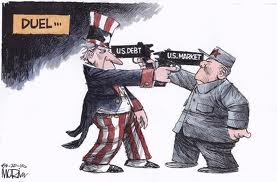‘A fundamental tenet of foreign affairs doctrine holds that sovereign nations will always define and act in their own national interests, and will rarely against their own interests. Somebody needs to tell that to the United States when it comes to China, many foreign policy experts say. A key part of America’s relationship with China now turns on a question that is, at its heart, an interminable conundrum: How to get Beijing to do what its leaders don’t believe are good for their country, but will benefit ours? From economics to climate change to currency to Iran and finally culminating with North Korea last week, America has sought to push, prod and cajole China, to little or no avail.
 Beijing has resisted letting its currency rise because it depends on a cheap Renmenbi (Yuan) to drive its export-heavy economy. China has also balked at international sanctions against Iran’s nuclear ambitions because China maintains a vital national interest relationship with Iran, and needs access to Iran’s oil and gas fields to fuel its own growth. On Global Warming and Energy policy, Beijing does not want to curb carbon emissions because doing so will harm China’s ability to lift hundreds of millions of its citizens from poverty, into middle class status over the coming decades is directly linked to its increased use of domestic energy demand. And, finally, Beijing has resisted reining in its unruly benefactor to the east, North Korea as the US implored it to do last week, because China doesn’t want to destabilize North Korea’s secretive regime to an extent that could lead to the government’s collapse and the North’s eventual reunification with South Korea. “China isn’t 100 percent on board with US efforts,” said Andrew L. Oros, an Asia expert at Washington College, because Beijing is “concerned with the idea of a unified Korea with US troops stationed there.” From a Realists perspective of an independent, sovereign nation that is a legitimate concern to China’s national security interests.
Beijing has resisted letting its currency rise because it depends on a cheap Renmenbi (Yuan) to drive its export-heavy economy. China has also balked at international sanctions against Iran’s nuclear ambitions because China maintains a vital national interest relationship with Iran, and needs access to Iran’s oil and gas fields to fuel its own growth. On Global Warming and Energy policy, Beijing does not want to curb carbon emissions because doing so will harm China’s ability to lift hundreds of millions of its citizens from poverty, into middle class status over the coming decades is directly linked to its increased use of domestic energy demand. And, finally, Beijing has resisted reining in its unruly benefactor to the east, North Korea as the US implored it to do last week, because China doesn’t want to destabilize North Korea’s secretive regime to an extent that could lead to the government’s collapse and the North’s eventual reunification with South Korea. “China isn’t 100 percent on board with US efforts,” said Andrew L. Oros, an Asia expert at Washington College, because Beijing is “concerned with the idea of a unified Korea with US troops stationed there.” From a Realists perspective of an independent, sovereign nation that is a legitimate concern to China’s national security interests.
“Basically, the U.S. wants China to do what the U.S. wants it to do,” said Rodger Baker, vice president for strategic intelligence at Stratfor, a geopolitical risk analysis company. “We want to make sure that the world stays as the United States would like to see the world. Which means making China subservient to us in some cases. In the case of North Korea, the Chinese see it as the United States pushing its policy on China and not allowing the Chinese to make their own policy, while removing from China one of the tools that it has decided it needs for its own interests.” In this case, that tool would be a divided Korea, with a North Korea that is beholden to and wholly dependent on China serving as a buffer against American encroachment in China’s backyard.
Just in the past few weeks alone, the US has seen in rapid succession, China’s own determination to push back against American demands. At the G-20 Summit in Seoul earlier this month, the US tried to get the world to come down hard on China for its devalued currency, but instead saw Beijing turn the tables. Instead of America leading the world in hectoring China, Beijing led the world in hectoring the US Federal Reserve on quantitative easing that international critics said had artificially lowered the value of the American dollar – a serious threat to global economic stability given the Greenback’s status as the global reserve currency of choice. As a result, many emerging economies, as well as Western allies have begun calling for a diversified portfolio of international currencies as a replacement for the ‘all-the-eggs-in-one-basket’ status of the US dollar.
“We’re still struggling with a post-unilateralist hangover,” said David Rothkopf, author of “Running the World: The Inside Story of the National Security Council and the Architects of American Power.” That hangover, he says, leads Americans to believe “that we’re the sole remaining superpower and the objective of our foreign policy is to” get sovereign nations to do what we want them to; to fall into step with our worldview and global leadership. “But the reality is, that’s not what the future holds.” Rather, Rothkopf argues, the US is heading into a future in which neither our European allies, nor countries like Brazil, China and India with increasingly independent sources of power, are no longer reliant upon, nor easily influenced by the United States, and so are pursuing their own national interests.’ Many global currency traders and central bankers refer to this economic trend as de-coupling.
Read more from Helene Cooper of the NYTs, here…
Sources: NYTs, IMF Publications, Yahoo Finance Video: Reuters